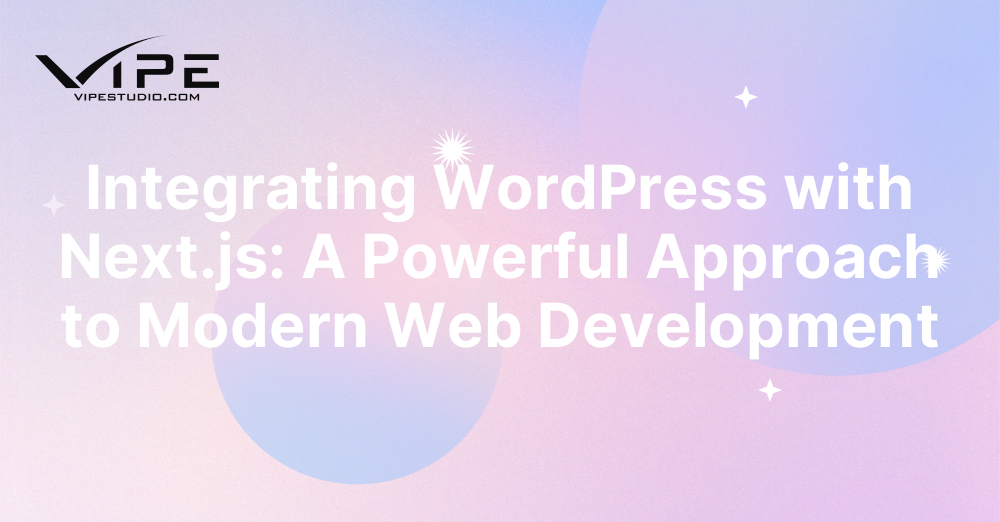20.04.2025
WordPress Development
Integrating WordPress with Next.js: A Powerful Approach to Modern Web Development
READING TIME: MIN
Table of Content
As enterprises look for ways to enhance user experiences, improve performance, and increase flexibility, the integration of WordPress with modern frameworks like Next.js has become a game-changer. This powerful combination allows businesses to leverage the best of both worlds: WordPress as a content management system (CMS) and Next.js for high-performance, server-side rendered applications. In this article, we will explore the benefits and implementation strategies for integrating WordPress with Next.js to create a cutting-edge, scalable digital platform.
The Limitations of Traditional WordPress Themes for Enterprise Websites
Traditional WordPress themes can be limiting for large-scale enterprise websites. These themes often rely on PHP to generate content dynamically, which can result in slower performance, especially as a site scales. For businesses that require fast, interactive, and SEO-optimized sites, WordPress alone may not provide the agility and performance needed to meet modern demands.
This is where Next.js comes in. As a React-based framework, Next.js enables server-side rendering (SSR) and static site generation (SSG), offering speed and flexibility that WordPress on its own cannot deliver. By integrating WordPress with Next.js, enterprises can overcome these limitations and unlock the power of modern web development.
Why Choose Next.js for WordPress Integration?
Next.js is renowned for its ability to deliver fast, SEO-friendly websites with a seamless user experience. The framework’s hybrid approach allows developers to combine server-side rendering and static site generation, resulting in faster load times and improved SEO performance. For enterprises looking to maintain a competitive edge, these features are essential.
In addition, Next.js’s ability to easily handle dynamic content through APIs makes it an ideal complement to WordPress. By decoupling the front-end from the back-end, businesses can create highly interactive, customized user interfaces while relying on WordPress to manage and deliver content.
Seamless API Integration: Connecting WordPress and Next.js
At the heart of the integration between WordPress and Next.js lies the use of APIs. WordPress can function as a headless CMS, delivering content through RESTful APIs or GraphQL to the Next.js front end. This decoupling of the back end and front end allows developers to have complete control over the design and functionality of the website while maintaining the content management capabilities of WordPress.
Using WordPress as a headless CMS means that the content is managed centrally within the WordPress dashboard, and developers can access this content via API calls. The Next.js application then takes over the responsibility of rendering the content and creating a dynamic user experience. This approach ensures that businesses can deliver personalized content to users across multiple devices and platforms, without sacrificing performance.
Enhanced Performance and SEO with Next.js
One of the key advantages of integrating Next.js with WordPress is the performance boost it provides. Next.js enables server-side rendering (SSR), which ensures that the content is pre-rendered on the server before being delivered to the user’s browser. This results in faster page load times, which is critical for improving user experience and SEO rankings.
Furthermore, Next.js supports static site generation (SSG), allowing developers to pre-render pages and serve them as static files. This reduces the load on the server, speeds up response times, and can significantly improve site performance, especially for content-heavy enterprise websites.
Flexibility and Scalability for Growing Businesses
As businesses scale, so do their website needs. WordPress’s flexibility as a CMS allows it to handle everything from blog posts to complex e-commerce sites, while Next.js provides the scalability required to manage traffic spikes and high-performance demands. By integrating the two, businesses can future-proof their websites and ensure they have a robust infrastructure capable of handling increased traffic and content volume.
Moreover, Next.js’s built-in features like automatic code splitting and incremental static regeneration (ISR) ensure that enterprise websites remain fast and responsive as they grow, even when dealing with large amounts of dynamic content.
Streamlining Development with a Decoupled WordPress-Next.js Stack
With a decoupled architecture, development teams can work more efficiently by focusing on specialized tasks. The back-end team can focus on managing content within WordPress, while the front-end team can design and develop the user interface with Next.js. This separation of concerns makes it easier to implement new features, perform updates, and troubleshoot issues without affecting other parts of the system.
Additionally, the decoupled architecture allows for more agile development workflows. Teams can build and deploy features independently, reducing the time needed to bring new functionality to market.
Ensuring Long-Term Success with Enterprise-Level Support
Implementing a WordPress and Next.js integration requires expertise in both platforms, as well as a deep understanding of API management and web development best practices. Working with experienced developers ensures that the integration is seamless, secure, and optimized for performance.
At Vipe Studio, we specialize in building scalable, high-performance WordPress and Next.js solutions for enterprise clients. Our team has the technical expertise to deliver cutting-edge websites that meet the complex needs of modern businesses. Whether you’re looking to integrate WordPress with Next.js or explore other headless CMS options, we can help.
Contact us today to learn more about how we can help your business take advantage of the latest web development technologies. Get in touch to discuss your project requirements and start building the future of your digital presence.
More on The Topic
- Navigating WooCommerce Performance: Real-World Strategies
- The Role of AI in WordPress Development Workflows
- Optimizing WordPress for Enterprise: Beyond Basic Caching
- WordPress and Headless Commerce: A Provocative Dilemma
- Decoupled WordPress Architecture: The Future or a Fad?
The content of this website is copyrighted and protected by Creative Commons 4.0.



